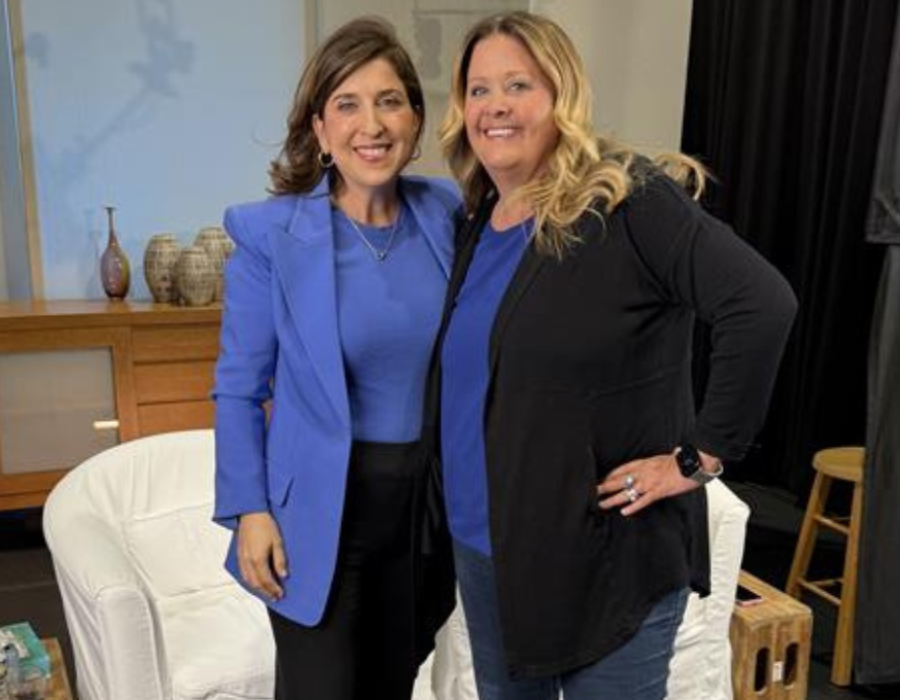
From Diagnosis, to Advocacy, to a ‘Good News’ Story
Summary: The Colorectal Cancer Alliance’s (Alliance) March 2025 media tour is promoting early colorectal cancer (CRC) screening. As part of this initiative, key spokespersons Christine Molmenti, PhD, MPH, scientific advisor to Alliance, and DeeDee West, a five-year cancer survivor and CRC screening advocate, are spreading the word to educate the public about current screening guidelines and CRC risk.
“"I would say it’s the mental gymnastics; the cancer diagnosis itself is overwhelming. I can’t explain it … it’s a lot to absorb.”
When DeeDee West found out the recommended colorectal cancer (CRC) screening age had been lowered to 45,1 it brought her to tears. It was the same day she was diagnosed with stage II CRC. “In 2020, at the age of 51, I became really sick. I was incredibly tired, weak, dizzy, and promised a family member that I would go get a physical,” she recalled during a recent Colorectal Cancer Alliance (Alliance) satellite media tour interview. “I went to the doctor, and he recommended I get a colonoscopy just based on my age,” she recalled. “A few months later, I was incredibly shocked to learn that I had cancerous polyps.” West would later learn from her oncologist that he estimated her tumor may have been in her colon for about six years. She couldn’t help but “do the math.”

Pictured from left: Christine Molmenti, PhD, MPH, with DeeDee West, Cancer survivor and patient advocate, in studio for Alliance March 2025 media tour.
Dealing with a cancer diagnosis
No one wants to hear the word cancer. “I would say it’s the mental gymnastics; the cancer diagnosis itself is overwhelming. I can’t explain it … it’s a lot to absorb,” said West. “You go down a really bad rabbit hole called ‘Google.’” Luckily, her search uncovered the Alliance, a non-profit patient advocacy organization she now works with to support the mission to raise CRC awareness and to provide support to patients and their caregivers impacted by CRC.
CRC symptoms
Awareness is a big part of the hurdle, according to Christine Molmenti, PhD, MPH, scientific advisor to the Alliance and Associate Professor; Cancer Epidemiologist, Department of Occupational Medicine, Epidemiology, and Prevention, Zucker School of Medicine at Hofstra/Northwell.
“Colorectal cancer symptoms are often silent, so screening at the recommended … age of 45 is crucial,”1 said Molmenti. “Sometimes people have no symptoms at all, and that’s often what we see in the earliest stages.” For those who experience symptoms, “it can vary from person to person,” she adds. “It may be rectal bleeding, it may be abdominal pain, you could feel fatigued, you may have unexplained weight loss,2 but just remember a lot of these symptoms could be dismissed or misinterpreted, especially among women when it comes to our menstrual cycle and other things that women experience.” Overall, she stressed, “You have to see your doctor if you’re having persistent symptoms related to pain, bleeding, weight loss, or fatigue.”2
See the American Cancer Society page: “Colorectal Cancer Signs and Symptoms.”
‘They didn’t know’
Molmenti’s life’s work is to keep spreading the word, because too many people don’t know about current screening recommendations. “We just conducted a survey in our OBGYN service line at Northwell Health, where we’re interviewing women sitting in the OBGYN waiting room. We have over 7,000 surveys collected,” she said. “We’re finding the number one reason for women at average or high risk [of CRC] not getting screened is they didn’t know they needed to be screened.”
We are young
Another reality that needs uncovering is the rate of younger patients developing CRC, according to Molmenti. “The leading cause of cancer death in men under 50 is CRC.3 And this wasn’t the case years ago. We’re now starting to see a lot of cases being diagnosed in [people in] their 20s, and 30s, and 40s, So it’s not uncommon to see this,”3 said Molmenti.
Communication at the polyp level
Awareness isn’t just an issue for the public, it’s an issue for healthcare professionals. To that end, Molmenti discussed her work with the National Colorectal Cancer Roundtable, Advanced Adenoma working group. “We have a large team across the United States of clinicians, scientists, surgeons, [who] help to develop the Advanced Colorectal Polyp GI Brief.”4 She explained that the publication is written largely for endoscopists to help them understand current guidelines, and how CRC risk and findings should be communicated to patients. “It’s not only family history of cancer that [should trigger] an earlier screening by family members, but advanced colorectal polyps [should also trigger] earlier screening,” she explained. “It should also trigger communication to family members, who may also be at risk. But without the endoscopist communicating this to the patient, they don’t know.”4
West feels strongly about communicating CRC risk and screening as part of her advocacy mission. “I continue to be a big advocate,” said West. “I drive my friends and family crazy trying to promote [screening] to prevent the diagnosis that I got. It’s not fun, but I’m happy to still be here, sharing my message.”
For some, the act of getting screened can feel like a foredrawn conclusion, according to Molmenti. “If you take the test it doesn’t mean you’re going to have cancer. The most positive story is that you either had nothing, or a polyp was removed,” if you had a colonoscopy. And the earlier this happens, the better. “That’s the message we want to get out there: It’s a positive story. This is a good news story when you’re screened.”
Read more “good news” on our companion site:
Interested in advocacy or in need of support?
References
1. Cancer.org. American Cancer Society Guideline for Colorectal Cancer Screening. Cancer Screening Guidelines. Revised January 29, 2024. Accessed March 13, 2025.
2. Cancer.org. Colorectal Cancer Signs and Symptoms. Revised January 29, 2024. Accessed March 28, 2025.
3. Cancer.org. American Cancer Society Colorectal Cancer Facts & Figures 2023-2025. Accessed March 13, 2025.
4. National Colorectal Cancer Roundtable. https://nccrt.org/resource/advanced-colorectal-polyp-brief/. Accessed March 28, 2025.





